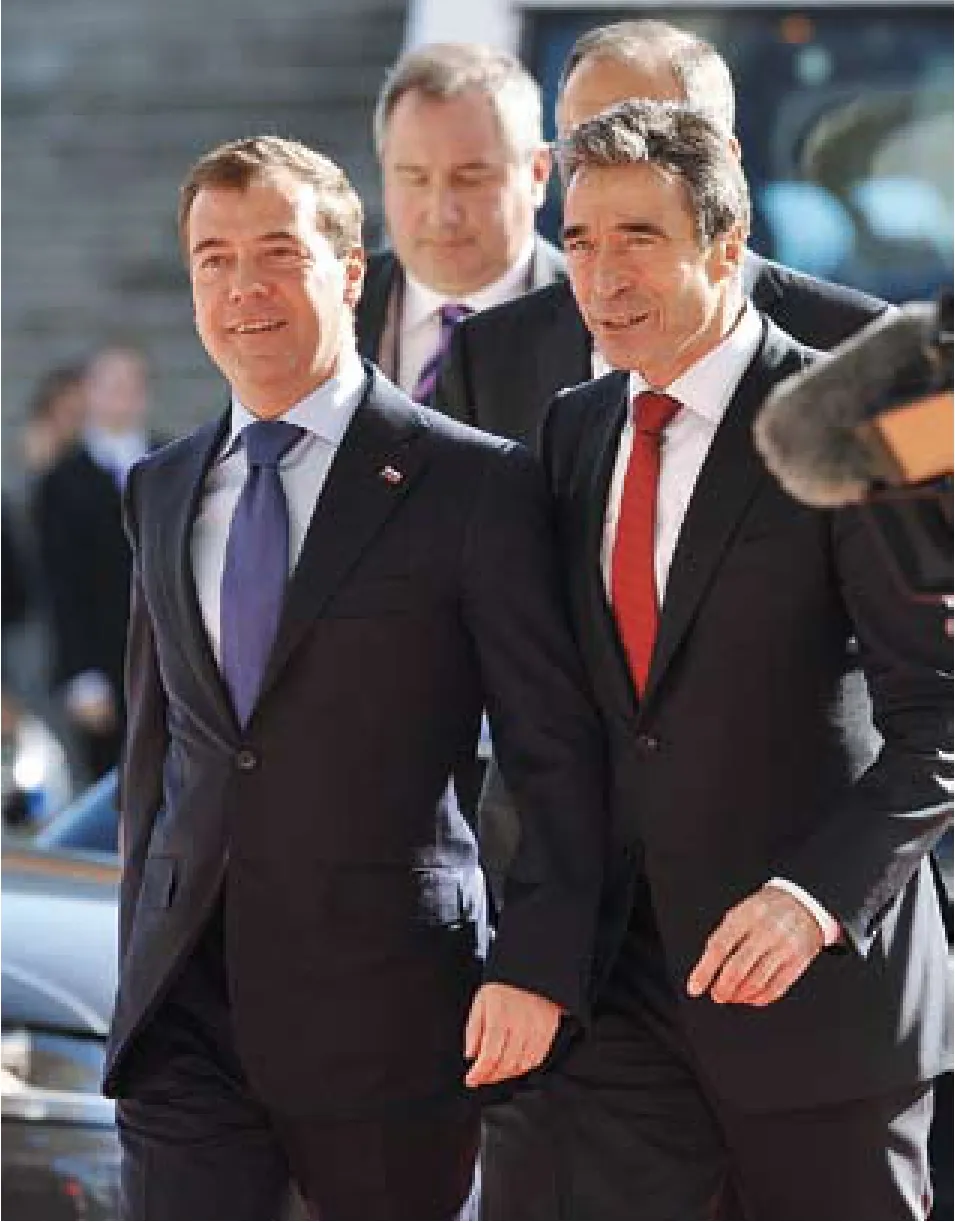A Global Future
2011-10-14ByYUYAN
By YU YAN
A Global Future
By YU YAN
NATO reaches out while looking ahead during its latest summit
The recent NATO Summit in Lisbon,Portugal, was one of the most crucial since the organization’s establishment 61 years ago, analysts said. The new Strategic Concept approved during the summit charts the future of this military bloc against the backdrop of major changes to the international security situation.
In addition to the new Strategic Concept,NATO members used the summit, which was held November 19-20, to make progress on the establishment of a European missile defense system, and to address NATO’s involvement in Afghanistan and relations with Russia.
New concept
“The biggest highlight of this summit was the new Strategic Concept,” said Xing Hua, a research fellow with the China Institute of International Studies. “It rede fi ned NATO’s core objectives and tasks, reformed its concept and brought forward its political,military, and external and internal relations policies in new circumstances.”
On the evening of November 19, leaders of NATO’s 28 member nations approved the new Strategic Concept as a guide for NATO’s development over the next 10 years.It was the organization’s third strategic document since the Cold War, and was regarded as a strategic adjustment based on the current global security situation.
In the decade since NATO formulated its last strategic plan, both the organization and the world have experienced big changes. Currently, members agree that traditional military attacks are highly unlikely.In the coming decade, NATO will mostly face non-traditional threats, including terrorism, ballistic missile attacks and cyber attacks.
The new Strategic Concept will launch a “more effective, more engaged, and more efficient” alliance, said NATO Secretary General Anders Fogh Rasmussen.
The new Strategic Concept outlines NATO’s purpose as safeguarding the security of its members through political and military means. It will continue to ful fi ll the three core tasks of collective defense, crisis management and cooperative security.
The new strategy stressed NATO’s need to adopt modern defense means against new threats. In the meantime, it reiterated the need to carry out actions beyond NATO borders and to develop partnerships across the world.
A core element of the fresh Strategic Concept is developing the capability of defending against ballistic missile attacks.NATO also agreed on the establishment of a European anti-missile system, planning to expand NATO’s current theater missile defense system to a territorial anti-missile system and expand the objects of protection from troops to the populations and territories of member states.
Rasmussen said the new Strategic Concept was not a simple document, but NATO’s “action plan,” and that NATO would take practical actions based on it.
Xing said this summit, unlike previous ones, adopted a more transparent approach.Before the summit, an expert group consisting of 12 top NATO diplomats was formed,with former U.S. Secretary of State Madeleine Albright as the chair. They submitted a report on NATO’s development in the coming decade before the opening of the summit.
“This proves NATO is dealing with challenges in a more objective way in the pressure of the current international situation,” said Xing.
Russian relations
Russian President Dmitry Medvedev’s presence was another highlight of this summit.Despite being a military organization born in the Cold War era, NATO is now discussing cooperation with Russia. This should promote a breakthrough in relations and re fl ects NATO’s effort to reposition, analysts said.
“NATO has been trying to cast off its role as a Cold War tool,” said Xing. “It is making efforts across the board to establish a real strategic partnership with Russia.”
An identity crisis exists in NATO. Since NATO’s rival—a group of East European nations led by the Soviet Union and bonded by the Warsaw Pact—disappeared after the Cold War,future development has been a problem. It was in this context that NATO planned reforms.
NATO wanted to prove that, although the Cold War was over, the organization was still valuable to the world, said Xing.
In fact, it is still the world’s biggest military and political bloc, and it plays an extremely important role in security, especially in Europe. It has been trying to meet the international community’s requirements on safeguarding global security.
Russia and Europe are facing the same security problems, said Zhao Junjie, a research fellow with the Chinese Academy of Social Sciences. Cooperation is the only effective solution to their problems.

FORGING PARTNERSHIP: NATO Secretary General Anders Fogh Rasmussen (right) and Afghan President Hamid Karzai sign an agreement on the establishment of a long-term partnership in Lisbon on November 20, while UN Secretary General Ban Ki-moon looks on

WU WEI
The threats facing NATO’s member states are becoming ever-more global. It is hard for NATO to address such threats effectively while remaining a regional military organization. NATO must properly handle relations with Russia and other regional powers, as well as with other international organizations including the EU and the UN.
Rasmussen said NATO and Russia should create a “security roof” for the entire Euro-Atlantic area. NATO’s new priorities include the development of a new defense shield to protect against missile attacks. And the alliance hopes to cooperate with Russia in constructing the new system.
U.S. President Barack Obama also expressed hope for cooperation. “In Lisbon we can make it clear that NATO sees Russia as a partner, not an adversary,” he wrote in theInternational Herald Tribunebefore the summit. “By moving ahead with cooperation on missile defense, we can turn a source of past tension into a source of cooperation against a shared threat.”
Russia agreed to cooperate with NATO in building the new missile defense system in Europe. The two sides will restore their previous cooperation on the theater missile defense system, and will study the possibility of cooperation on a territorial anti-missile system.
NATO and Russian experts are to hold meetings to discuss how to technically link their missile defense systems. They will submit a technical report before the NATORussia Council Summit in June 2011.
In addition to cooperation on missile defense, Russia also agreed to expand cooperation with NATO on the Afghanistan issue at Medvedev’s meeting with NATO leaders on November 20. They will expand NATO’s transport corridor within the Russian border,and will strengthen the training of Afghan anti-narcotics of fi cers.
Rasmussen said the agreement reached during the summit marked a transitional point in NATO-Russia relations.
Medvedev said this summit was a very important step for strengthening Russia-NATO relations.
“NATO must improve its relations with Russia, so as to prove its status as a military and political bloc that can contribute to European security,” said Xing. “So it decided to build the missile defense system jointly with Russia to eliminate Russia’s doubts on this issue.”
Improved relations with Russia would be noticeable in NATO’s external relations in the future, he added. But, the development of the relationship will not go smoothly, due to pre-existing differences.
Afghanistan was also a focus of the summit. On the second day of the summit,Rasmussen and Afghan President Hamid Karzai signed an agreement to establish a long-term partnership between them, with UN Secretary General Ban Ki-moon as the witness.
NATO leaders officially determined a timetable to hand over control of security to the Afghan Government. The shift of power will begin in early 2011 and will be complete by the end of 2014. Beyond 2014, NATO troops in Afghanistan will be responsible for training Afghan forces, but will not engage in combat.
During the summit, NATO also summarized the war in Afghanistan and admitted military means alone are unable to solve the problems in Afghanistan. And NATO stressed it should strengthen cooperation with relevant countries and international organizations, and implement a comprehensive solution, including civil and military aspects.
